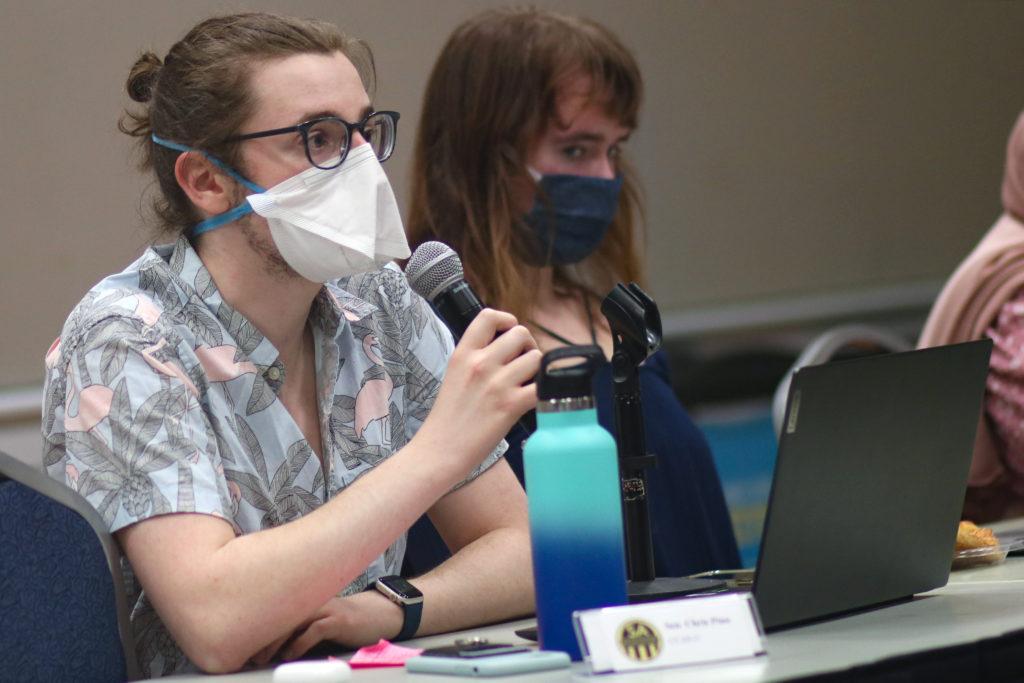The Student Association Senate failed to pass two referenda that could have expanded the powers of the Student Court and add 12 seats to the senate.
If passed, the referenda would be the first for the SA to place on its election ballot later this month. Senators have yet to approve any referenda for the SA elections on March 29 and 30, but they have until their next meeting on March 28 to do so.
Senators tabled the Electoral and Representational Reform Act, which would have called a referendum to ask the student body whether the SA should amend the SA Constitution to apportion six undergraduate at-large senate seats and six graduate at-large seats during the fall semester. One of the 42 seats on the senate is currently vacant – a graduate seat representing the School of Engineering and Applied Science.
If approved by the student body, the Joint Elections Commission would conduct a fall election to elect the 12 at-large senators to fill the new positions.
Sen. Chris Pino, CCAS-U and the sponsor of the legislation, said the referendum would allow students to vote in more candidates, promoting more “direct democracy” in the SA. He said withholding a referendum would “stifle” students’ opinions about the SA Constitution.
“I understand that some of us have a personal and very spirited opposition to the bill, and I get that, but this could be direct democracy in action,” Pino said. “I really, really hope we are willing to give up our power to prevent this and instead give that power to the student body to make that choice for themselves.”
Senators who opposed the bill said the referendum is not necessary because the SA has struggled to fill vacant seats on the senate throughout its term. SA Sen. Athena Atsides-Del Valle, U-at-Large, said electing new senators in the fall, several months after the SA’s regular spring elections, is “not fair” to SA members because of the senate’s workload and time management issues.
“We do have so many vacancies, and I really think that needs to be emphasized at this point in time,” Atsides Del-Valle said. “I mean, what is the point? I do not believe we need any increase of seats, period.”
The senate rejected the Judicial Reform Act – sponsored by SA Sen. Cordelia Scales, SEAS-U and senate chairperson pro-tempore – which would have called a referendum to ask the student body to expand the powers of the Student Court to include jurisdiction over the SA charter and constitutional referenda that the senate passes. If approved by the student body, the court would have more power to issue advisory opinions on matters that are not brought before the court in a formal complaint, according to the legislation.
Senators also passed a bill to create a new legal counsel that will represent the senate in court cases. The senate’s presiding officer – currently the SA vice president – will be responsible for appointing a student to fill the position.
Pino, who also sponsored the Senate Legal Counsel Act, said it was necessary to create the position because senators wishing to defend their legislation in the court are at an “intrinsic disadvantage” without an SA legal counsel. The Student Court clarified that the Office of the Legislator General, which is housed in the SA’s executive branch, should serve “at the pleasure of the President” in a decision last semester.
“Frankly, no senators seeking to defend their legislation or no senate seeking to defend their legislation should be forced to learn how to lawyer on only days’ notice and then work alone to produce over 200 pages of legal documents that would be required in a case like that in a period of only weeks,” Pino said.
Interim University President Mark Wrighton delivered his first address to the senate at the meeting, answering senators’ questions about the quality of facilities, the current state of academic advising and ways to contact him. He said officials will prioritize “lower energy consumption” at GW and renovations at buildings with “inefficient infrastructure,” including faulty HVAC systems.
“I’d like you to know how appreciative I am of the generous welcome that I have received,” Wrighton said at the meeting. “Students have been incredibly enthusiastic as they have interacted with me. I really appreciate again that you have chosen the George Washington University for your studies.”
The senate also approved $8,200 for dance group Capital Funk’s 13th Annual Showcase known as “Funk Academy!”
The next senate meeting will be held March 28 at 8:30 p.m. in the State Room in the Elliott School of International Affairs.








